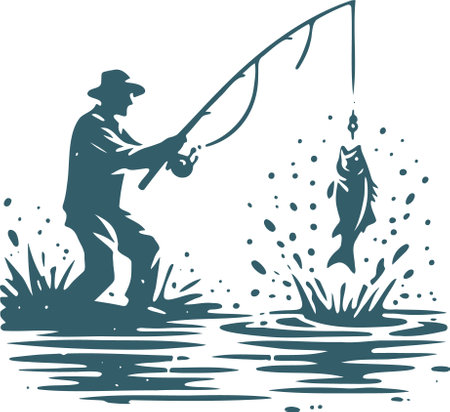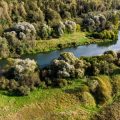Introduction: Barbel Fishing in the UK
Barbel fishing holds a special place in the hearts of British anglers. The barbel itself, a powerful and elusive fish found primarily in the rivers of England and Wales, has long been considered one of the most challenging species to catch. Its presence in iconic waterways like the River Trent, Severn, and Wye has made barbel angling a cherished tradition, woven into the fabric of British countryside life. Over generations, this pursuit has evolved from a niche interest into a significant part of the nation’s angling culture, often seen as a test of skill, patience, and respect for nature.
Historically, angling—especially for species like barbel—has been dominated by men. Tackle shops, fishing clubs, and riversides were once almost exclusively male spaces. However, in recent years there has been a noticeable shift. Women are increasingly taking up the rod and reel, both as passionate hobbyists and as trailblazers within their local communities. This change is not just about numbers; it reflects a broader cultural transformation towards inclusivity and diversity within British outdoor pastimes.
The growing participation of women in barbel fishing is bringing new perspectives and inspiring stories to the community. Female anglers are challenging stereotypes, forming supportive networks, and sharing their achievements through social media and angling clubs. Their contributions are enriching the sport, encouraging others to get involved, and helping to foster a welcoming environment for all enthusiasts—regardless of gender.
| Aspect | Traditional View | Current Trends |
|---|---|---|
| Cultural Significance | Male-dominated pastime with deep roots in British heritage | Increasing female participation; viewed as inclusive family activity |
| Community Involvement | Mainly organised by men’s clubs and societies | Growth of women’s groups, mixed events, and mentorships |
| Representation in Media | Predominantly male-focused magazines/shows | Rising number of female anglers featured and celebrated |
This article explores how women across Britain are making waves in barbel fishing—sharing their journeys, overcoming obstacles, and inspiring others to follow in their footsteps. Through real-life accounts and practical insights, we’ll uncover how the evolving landscape is shaping the future of angling in the UK.
2. Breaking Barriers: Women Making Their Mark
For many years, barbel fishing in the UK was seen as a male-dominated pursuit, but an increasing number of pioneering women have been challenging this stereotype and making significant contributions to the sport. These trailblazing anglers not only share a passion for catching elusive barbel but have also faced and overcome unique hurdles that their male counterparts may never experience.
Many of these women entered the angling scene through family connections or local fishing clubs, often starting as observers before picking up a rod themselves. Others discovered the sport independently, drawn by the peaceful riversides and the thrill of the catch. Regardless of how they began, their journeys have required resilience, determination, and a willingness to stand out.
Overcoming Challenges on the Bank
British women in barbel fishing have had to tackle several challenges that range from practical issues to social perceptions. Let’s look at some common barriers and how female anglers are breaking them down:
| Challenge | How Women Are Overcoming It |
|---|---|
| Lack of Representation | By sharing stories online, joining clubs, and forming support networks, women inspire others to join and raise visibility within the community. |
| Gender Stereotypes | Pioneers demonstrate skill and knowledge on par with male anglers, earning respect through competition results and expert advice. |
| Access to Equipment & Facilities | Brands now offer tackle and gear designed specifically for women, while clubs work towards more inclusive facilities. |
| Knowledge Gaps | Workshops and mentoring schemes run by experienced female anglers help newcomers learn essential techniques safely and confidently. |
Pioneering Figures in British Barbel Fishing
The British angling scene boasts several notable women who have helped pave the way for others:
- Sue Gough: One of the first women to win regional barbel competitions, known for her advocacy of river conservation and female participation.
- Katie Griffiths: Renowned for her technical skills and regular features in angling publications, Katie mentors young girls interested in coarse fishing.
- Lizzie Dyer: An active member of national angling associations, Lizzie organises events tailored for women and families at popular barbel stretches across England.
The Ripple Effect in Local Communities
The efforts of these pioneering women are inspiring change far beyond individual achievements. Their involvement encourages local angling clubs to foster a more welcoming atmosphere, adapt facilities for mixed groups, and run “women-only” sessions that help beginners build confidence. As role models, they prove that barbel fishing is open to everyone—regardless of gender—if you have the passion and perseverance to pursue it.

3. Personal Journeys: Inspiring Stories from the Riverbank
Barbel fishing has long been seen as a male-dominated pursuit, but across the UK, an increasing number of women are challenging this stereotype and making their own mark along the country’s winding rivers. Their real-life stories not only highlight memorable catches but also reveal how the sport has positively impacted their personal lives and local communities.
Real Experiences from Women Anglers
Many women anglers from England, Scotland, and Wales have shared their unique journeys into barbel fishing. For some, it began as a family tradition; for others, it was curiosity or the desire to find peace by the water that drew them in. Take Sarah Evans from Gloucestershire, who started fishing with her grandfather as a child. She recalls her first barbel catch on the River Severn: “I still remember the adrenaline rush and sense of achievement—it changed my confidence entirely.”
Another inspiring story comes from Nicola James in Yorkshire. Facing mental health challenges during lockdown, she found solace by the River Aire. “Barbel fishing gave me structure and mindfulness,” she explains. Now, she regularly mentors other women interested in angling through local clubs.
Memorable Catches and Achievements
| Name | Region | Memorable Catch | Impact on Life |
|---|---|---|---|
| Sophie Turner | Surrey | 12lb Barbel on River Thames | Boosted self-esteem and inspired her to join a local club committee |
| Emma Davies | Lancashire | First double-figure barbel at age 18 | Became a role model for young girls in her village angling society |
| Helen Morris | Kent | Caught her PB barbel after five years of trying | Taught patience and resilience, encouraging her to coach newcomers |
The Broader Influence of Barbel Fishing on Women’s Lives
The impact of barbel fishing goes beyond just landing impressive fish. For many women, it fosters friendships, provides a sense of belonging within the British angling community, and offers a healthy escape from daily stresses. These experiences show that riverside moments can be transformative—instilling confidence, perseverance, and a deeper connection to nature.
Community and Camaraderie on Britain’s Waterways
The British barbel fishing scene has transformed over recent years, with a strong focus on community spirit and camaraderie, particularly among women anglers. As more women take up the rod, supportive networks and inclusive angling clubs are helping to break down barriers, creating a welcoming environment for everyone. In this section, we’ll explore how these communities come together across the UK’s rivers and lakes, empowering female anglers and fostering lifelong friendships.
Supportive Networks for Women Anglers
Women in barbel fishing often find their confidence boosted by joining dedicated groups and online forums. These platforms provide a space to share stories, exchange tips, and offer encouragement—no matter your experience level. Many of these networks organise regular meetups or ‘fish-ins’, which are friendly gatherings where new anglers can learn from seasoned pros in a relaxed atmosphere.
Key UK Organisations Supporting Women in Barbel Fishing
| Organisation | Main Activities | Benefits for Members |
|---|---|---|
| The Ladies Fishing Club UK | Workshops, river sessions, online support | Skill-building, mentorship, social events |
| Barbel Society Women’s Group | Exclusive fish-ins, seminars, community projects | Access to expert advice, networking opportunities |
| Angling Trust – Get Fishing for Wellbeing | National campaigns, coaching sessions, mental health initiatives | Inclusive learning environments, wellbeing support |
Angling Clubs Embracing Inclusivity
Across Britain, many traditional angling clubs now welcome women as active members. Some have even set up women’s sections or mixed teams for competitions. This shift not only encourages greater participation but also brings fresh perspectives to club management and event organisation. The sense of belonging within these clubs helps new members quickly feel at home on the bank.
The Role of Social Initiatives in Empowering Women
Bespoke social initiatives—ranging from charity matches to conservation days—give female anglers meaningful ways to get involved beyond just catching barbel. Initiatives like ‘Women Go Fishing’ days raise awareness about the joys of angling and promote positive messages about mental health and outdoor activity. These programmes often partner with local businesses or tackle shops to provide equipment or prizes, lowering the entry barriers for newcomers.
Camaraderie: More Than Just Fishing Together
The true power of these communities lies in the friendships formed along Britain’s waterways. Sharing a sunrise on the Trent or an evening by the Wye creates memories that last far beyond the day’s catches. For many women, it’s the shared laughs, encouragement during tough sessions, and celebrating each other’s achievements that make barbel fishing truly special.
5. Tackle, Techniques, and Local Insights
One of the most exciting aspects of barbel fishing in the UK is the sheer variety of approaches adopted by women anglers across the country. From the winding stretches of the River Severn to the gravelly runs of the Trent, female barbel enthusiasts are not only mastering classic methods but also bringing their own flair to the bankside. Here, we break down their favourite kit, regional tactics, and some tried-and-tested tips that can help anyone improve their barbel angling game.
Essential British Tackle: What Female Anglers Prefer
Successful barbel fishing starts with having the right gear. Many experienced women in the scene recommend using robust yet sensitive tackle that can handle powerful runs. Here’s a quick overview of popular choices:
| Tackle Item | British Term | Female Anglers’ Top Picks |
|---|---|---|
| Rod | Barbel rod (1.75–2lb test curve) | Daiwa Black Widow, Fox Rage Terminator |
| Reel | Baitrunner or Free-spool reel | Shimano Baitrunner DL, Okuma Ceymar |
| Mainline | Braid or mono (10–15lb) | Korda Carp Line, Gardner HydroFlo Braid |
| Hooklink | Fluorocarbon or coated braid | Korda IQ2, Nash Skinlink |
| Terminal Tackle | Leads, feeders, swivels | Drennan Inline Feeder, Korum Feeders |
Favourite Methods Across Regions
The techniques used often reflect both personal preference and local river characteristics. Here’s how some standout female anglers adapt their approach:
- The Trent: PVA bagging and pellet feeders are favourites among Nottinghamshire anglers like Sarah McKenna, who recommends double 8mm halibut pellets for a strong scent trail.
- The Severn: Maggot feeder rigs excel in coloured water; Lucy Walsh prefers a helicopter rig with red maggots during summer floods.
- The Wye: Caster and hemp combinations work wonders on clear days. Angler Emily Hughes swears by a simple running lead and size 10 hook set-up for wary specimens.
- The Thames: Luncheon meat ledgering is still a proven winner; try garlic-flavoured cubes as shared by local expert Hannah Price.
Bankside Tips from Female Barbel Fishers
- Travel light: Use a compact rucksack and keep kit minimal for roving tactics along long river stretches.
- Blend in: Wear muted clothing and use low-profile tackle boxes to avoid spooking fish in clear water.
- Scent matters: Don’t underestimate the power of smelly baits—garlic spam, krill pellets, and spicy boilies are all top choices.
- Keen observation: Spend time watching for rolling barbel at dusk before committing to a swim.
- Tide timing: On tidal rivers like parts of the Thames or Trent, time your sessions around slack water for best results.
A Community Approach Suited to British Rivers
The British angling scene is shaped by its rivers—and so are its tactics. By sharing insights on tackle choice and local methods, women in barbel fishing continue to inspire others to try new techniques while respecting regional traditions. Whether you’re targeting specimen fish or just enjoying a day on your local stretch, these practical tips will help you blend into the landscape and maximise your chances of success on classic UK waters.
6. Encouraging the Next Generation
Supporting and inspiring the next generation of female barbel anglers is essential to creating a more diverse and inclusive British angling community. Across the country, dedicated individuals, clubs, and organisations are making concerted efforts to mentor, guide, and open doors for girls and women eager to try their hand at barbel fishing. These initiatives not only cultivate skills but also foster a sense of belonging and confidence among new anglers.
Mentorship Schemes and Role Models
Many experienced female anglers are stepping forward as mentors, offering guidance both on and off the riverbank. Through structured programmes and informal support networks, they share practical advice on tackle selection, watercraft, bait presentation, and the unique challenges of targeting barbel in British rivers. Having visible role models helps newcomers see what’s possible and encourages persistence despite initial setbacks.
Key Mentorship Initiatives
| Initiative | Description | Region |
|---|---|---|
| Women’s Angling Coaching Days | Organised sessions led by certified coaches focusing on barbel fishing techniques. | Midlands, South East England |
| Junior Girls’ Fishing Camps | Weekend camps aimed at introducing girls to coarse fishing with a focus on barbel. | Northern England, Wales |
| Peer-to-Peer Buddy Systems | Pairing beginners with experienced female anglers for ongoing support. | Nationwide |
| Online Knowledge Sharing Groups | Active forums and social media groups where women share tips, stories, and encouragement. | UK-wide (digital) |
Creating Opportunities for Girls and Women
Beyond mentorship, local angling clubs are revising membership policies to be more welcoming to women and young people. Subsidised memberships, dedicated ladies’ matches, and ‘have-a-go’ days help lower barriers to entry. National bodies such as the Angling Trust have launched campaigns specifically aimed at increasing female participation in coarse angling – often using successful barbel anglers as ambassadors to reach wider audiences.
Tackling Challenges Together
The journey isn’t without its obstacles: from overcoming stereotypes to tackling logistical issues like access to suitable facilities or equipment. Collaborative efforts from both men and women in the community are breaking down these barriers. By providing safe spaces, tailored coaching sessions, and celebrating every achievement – no matter how small – the British barbel fishing scene is gradually becoming more representative of society at large.
The Ripple Effect: Inspiring Lifelong Passion
When girls and women find encouragement early on, they’re more likely to develop a lifelong connection with angling. The joy of catching a hard-fighting barbel on a summer evening can spark a passion that endures for decades. Ultimately, by investing in mentoring, creating opportunities, and supporting each other at every level, Britain’s angling community ensures that the riverbanks remain vibrant places for everyone – now and in the future.
7. Looking Forward: The Future of Women in British Barbel Fishing
As we reflect on the progress made by women in the British barbel fishing community, it’s clear that the landscape has changed remarkably over recent years. While inspiring stories abound and new role models have emerged, the journey is far from over. Let’s break down where we stand today, identify ongoing challenges, and explore how women’s roles are set to evolve in UK barbel fishing.
Reflections on Progress
Women have steadily carved out a place for themselves along Britain’s rivers, sharing bank space with seasoned anglers and newcomers alike. Initiatives such as women-only angling clubs and inclusive events have encouraged more participation than ever before. This shift has not only fostered greater diversity but also helped to challenge long-standing stereotypes about who can succeed in coarse fishing.
| Milestone | Impact |
|---|---|
| Formation of female-led angling groups | Provided support networks and boosted confidence |
| Media coverage of female anglers’ achievements | Raised visibility and inspired wider participation |
| Inclusion in national competitions | Validated skill and dedication regardless of gender |
Remaining Challenges
Despite clear progress, several hurdles remain. Access to mentorship, funding for gear and travel, and overcoming lingering biases can still be significant barriers. In some regions, traditional attitudes persist, making it harder for women to feel truly welcome at certain fisheries or events. Additionally, balancing family responsibilities with time-consuming sessions on the river continues to be a common concern among female anglers.
Main Obstacles Faced by Women Anglers
- Lack of visible female mentors
- Limited sponsorship opportunities
- Cultural stereotypes within local clubs
The Road Ahead: Evolving Roles and Opportunities
The future looks promising as more organisations commit to inclusivity. Mentorship schemes specifically targeting young girls, improved access to coaching, and greater representation in angling media are all vital steps forward. Social media also plays a pivotal role in building supportive online communities where experiences and advice are shared freely.
Key Strategies for Continued Growth
- Expanding educational workshops led by experienced female anglers
- Encouraging mixed-gender teams in competitions
- Pushing for policy changes at club level to ensure equality of access and opportunity
The continued evolution of women’s roles in UK barbel fishing hinges on collective effort—by individuals, clubs, and national bodies alike. By recognising both the strides already taken and the work that remains, we can look forward to a future where everyone feels equally empowered to cast a line into Britain’s iconic rivers.


